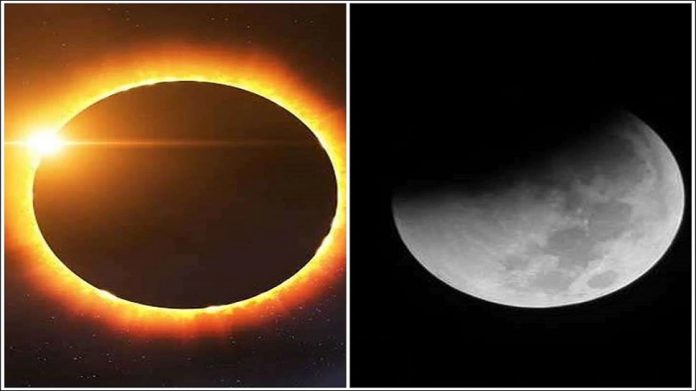There will be a total of four eclipses in 2022, some of them will be partial eclipses while others will be total eclipses. Determine how many of these eclipses will be seen in India, as well as their Sutak time.
In both astronomy and astrology, solar eclipses and lunar eclipses are regarded as significant events. Eclipses are regarded as unfavorable in astrology while astronomers wait to witness them in order to gain fresh knowledge from them. These eclipses have a significant impaSurya Grahan And Chandra Grahan In 2022ct on people’s lives. This year, there will be a total of four eclipses in the year 2022. Two of these are solar eclipses, while the other two are lunar eclipses.
Read More – Foreign Trip for Less Money! These 8 Countries are the Cheapest for Indians to Visit
On these dates, there will be eclipses.
The year’s first eclipse: A solar eclipse will be the first eclipse of the year. On April 30, 2022, it will be from 12:15 p.m. to 04:07 p.m. This will be a partial eclipse of the sun. Southwest America, the Pacific Ocean, and Antarctica will all be visible. Due to the fact that this eclipse would not be seen in India, its time will be invalid.
The year’s second eclipse: A lunar eclipse will be the year’s second eclipse. On May 16, 2022, the second eclipse of the year and the first lunar eclipse will occur. From 7:02 a.m. to 12:20 p.m., this will take place. This lunar eclipse, like the first solar eclipse, will not be seen in India. As a result, its Sutak period will be invalid. South-Western Europe, South-West Asia, Africa, North America, South America, Pacific, Atlantic, Antarctica, and the Indian Ocean will all see this eclipse.
Third eclipse of the year: On October 25, 2022, the third eclipse of the year and the second solar eclipse will occur. This will also be a partial eclipse, lasting from 04:29 to 05:42 p.m. This, too, will be unnoticed in India. Europe, South-West Asia, Africa, and Atlantica are all home to this species. This eclipse’s Sutak period will likewise be invalid.
The last and second lunar eclipses of the year will take place on November 8 from 01:32 pm to 07:27 pm. This will be a total lunar eclipse that can be seen from India. As a result, the Sutak period will continue to be valid. This eclipse can be observed in South-East Europe, Asia, Australia, North America, South America, the Pacific, Atlantic, and Indian Oceans, in addition to India.



